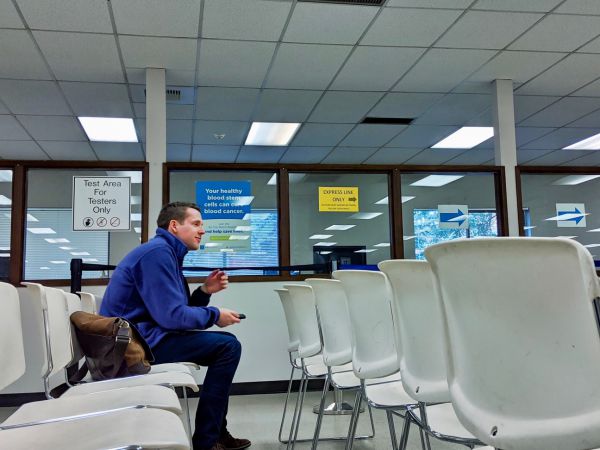Table of Contents
Building Becomes an Accessible Vinyl Shop
Hunting Area Confirms Accessibility Thanks to the ADA
Mother Advocates for Changes to School's Accessibility Policies
Low-Income Housing Complex Installs Accessible Parking
Call Center Becomes ADA-Friendly with Scent-Free Policy
City Improves Accessibility for Outdoor Dining
Spanish Sign Language Interpreter Joins College Graduation
Member of a College Chess Club Gets an Accommodation
Teacher with Disability is Granted a Reasonable Accommodation in High Temperatures
Doctor's Office Makes Changes to Ensure Accessible Appointments for People with Disabilities
Medical Professional Learns About Service Animals in Healthcare Settings
Delivery Driver Rehired After Disability Discrimination
A Non-Profit Soccer League Provides An ASL Interpreter For The Field
A Coffee Company Improves Accessibility and Opens Doors for Everyone
College Bathrooms Remodeled for Wheelchair Access
Telework Granted as a Reasonable Accommodation
Workplace Daycare Changes Meal Plan for Child with Severe Allergy
Library Provies an ASL Interpreter for Story Time
Swimming Pool Accommodates Patron’s Parking Needs
A Call With an ADA Specialist Allowed a Volunteer to Attend an Annual Dinner
A Driving Exam was Given in an Accessible Format
A Small Business Owner Was Able to Ensure Access to Her Business During Construction
A Local Wheelchair Sports Team Wins a Policy Change on the Court Thanks to the ADA
Accessible Lawn Bowling Made Possible Thanks to the ADA
A Call to the ADA Center Helps a Dance Studio Provide an Interpreter for a New Student Who Is Deaf
Portable Healthcare Rooms Allow Everyone to Remotely Access a Doctor Thanks to the ADA
A Young Man with Down Syndrome Attended His Senior Prom Just the Way He Wanted To
A Pipe Welder Kept His Job with the Assistance of an ADA Center
Health Club Chain Becomes More Accessible for Everyone
A Construction Worker Secured a Job Accommodation After a Call to His Regional ADA Center
Building Becomes an Accessible Vinyl Shop
Kaia purchased a building for her new business. She was on a mission to attract all music lovers in the community to her used vinyl shop. The building needed some updates before it would be ready to open. The small bathroom had a broken sink, and the shop entrance needed a new door. Kaia wanted to comply with the Americans with Disabilities Act (ADA) when she did the remodel so people with disabilities could visit her business. But she wasn’t quite sure what ADA compliance meant or where to start.
After a fellow small business owner told Kaia about the ADA National Network, Kaia contacted her regional ADA Center. The ADA Specialist told Kaia about the 2010 ADA Standards for Accessible Design, which describe the minimum requirements for making buildings accessible for people with disabilities. The ADA Specialist also explained that sometimes barrier removal is not technically feasible. For example, it may not be possible to make a bathroom large enough for a wheelchair user to turn if it would require knocking down a load-bearing wall. Kaia also learned that even if a barrier couldn’t be removed because of technical infeasibility, she would still need to make readily achievable changes.
Kaia shared the information with her contractor, and they reviewed the design plans together. After realizing one of the bathroom walls was load bearing, they could not move forward with enlarging the bathroom. Instead, they added grab bars. It was possible to install a wheelchair ramp and lever-style door handles to make the shop’s entry accessible. After the opening day, a group of people with disabilities posted on social media about how they felt welcomed at the new store. Thanks to the ADA, Kaia’s mission was accomplished.

Hunting Area Confirms Accessibility Thanks to the ADA
Stanley works for his county’s park department and was designing a hunting blind, which is a small structure hunters use to hide from wildlife. He was confident that the hunting blind met the 2010 Standards for Accessible Design. However, he wasn’t sure what to do about requiring hunters to retrieve the hunted wildlife from the nearby woods and fields, which cannot be made accessible for wheelchair users. He needed help to understand what kind of policy would meet Americans with Disability Act (ADA) requirements.
Looking for answers, Stanley reached out to his regional ADA Center. He asked them if the parks department would be required to provide hunters with mobility disabilities with a second hunter to retrieve hunted wildlife from non-paved areas. His regional ADA Center let him know that his question fell under Title II of the ADA, which applies to state and local governments. The ADA Specialist said that the parks department couldn’t require a second hunter to assist hunters with mobility disabilities. Requiring a second hunter would violate the non-discrimination requirements of the ADA because it would set a requirement for hunters with disabilities that doesn’t apply to hunters without disabilities. However, they could require all hunters to retrieve hunted wildlife. Hunters with mobility disabilities would then have the option to bring a second hunter to retrieve wildlife if necessary. They also reviewed the 2010 Standards for Accessible Design together, and the ADA Specialist confirmed that Stanley’s plans met the requirements.
Thanks to the ADA and the help of his regional ADA Center, the hunting blind policies and design allowed everyone to enjoy the park amenities.
.jpg)
Go Back to Top
Mother Advocates for Changes to School's Accessibility Policies
Madeline’s teenage son, David, had a progressive disability. Soon, David would need to use a wheelchair full time. In preparation, Madeline contacted David’s school to see how they would accommodate his disability. She was curious about things such as classroom location, accessible parking spots, automatic doors, and fire evacuation procedures.
Madeline was discouraged by the initial conversation with the school and left feeling like the administrator didn’t know much about accessibility or students’ rights. Looking for help, Madeline reached out to her regional ADA Center. The ADA Specialist told her that David had protections under two laws: the Americans with Disabilities Act (ADA) and Section 504 of the Rehabilitation Act. The school was required to fulfill the program access requirements of the ADA. Under the ADA, program access means that a public entity's services, programs, or activities, when viewed in their entirety, must be readily accessible to and usable by individuals with disabilities. In this case, that meant the school may have to shuffle schedules or classroom locations, assign additional staff, or make other changes to make public school accessible to David. The ADA Specialist emailed Madeline with additional resources about the ADA and gave her contact information for organizations which could give her information about Section 504.
Madeline approached the school again, this time with more information to help her advocate for her son’s rights. The school moved David’s math class to a first-floor classroom, created an accessible parking spot, reviewed the fire evacuation procedures for students with disabilities, and created a plan to conduct an audit for automatic doors. Madeline was able to successfully navigate the situation, thanks to the ADA and her regional ADA Center!
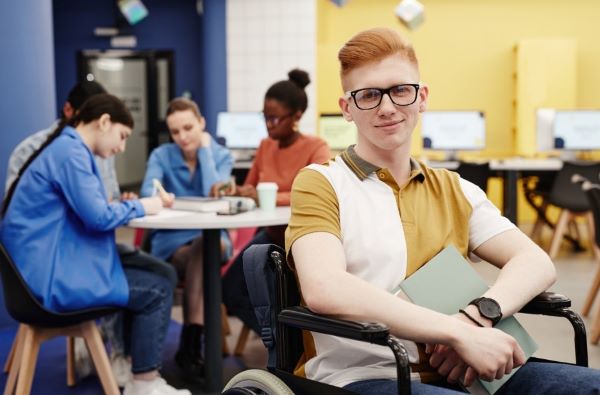
Low-Income Housing Complex Installs Accessible Parking
Casey recently moved into a low-income housing complex for people making less than the federal poverty level. Because they are a person with a mobility disability that makes it difficult to walk, Casey needed a designated accessible parking spot near their unit as well as near the leasing office. Because they lived in low-income housing, Casey wasn’t sure if they could ask the housing complex to put in accessible parking spots. Casey called the Americans with Disabilities Act (ADA) National Network hotline to check what the law actually says.
The ADA Specialist at the regional ADA Center told Casey that just because the complex is low-income housing does not relieve them of following the ADA or another civil rights law called the Fair Housing Act. Casey had the right to accessible parking. The ADA Specialist worked over the phone to help Casey draft a letter to send to the leasing office asking for more accessible parking.
After receiving the letter, the leasing office installed several accessible parking spots around the complex. The leasing office followed the 2010 ADA Standards for Accessible Design to ensure the spots were accessible. Thanks to the ADA, Casey had the access they needed to drop off their rent check.
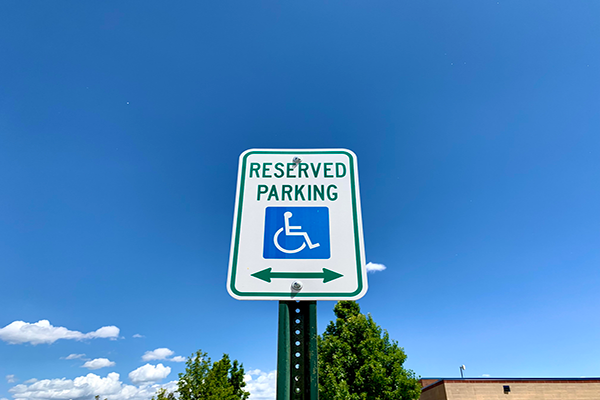
Call Center Becomes ADA-Friendly with Scent-Free Policy
Genevieve works at a call center and gets migraines when she is around strong scents. These migraines impact her day-to-day and make it difficult for her to get her work done. Her office has a scent-free policy, but one of Genevieve’s coworkers started wearing perfume to the office. Management did not enforce the scent-free workplace rule and Genevieve started getting daily migraines. She had to leave work early several times.
Concerned about her ability to do her job, Genevieve reached out to her regional ADA Center to learn more about her rights in the workplace. Genevieve was surprised to learn that her chronic migraines were considered a disability under the Americans with Disabilities Act (ADA) because they affected her ability to perform major life activities. Major life activities are functions that are important to most people’s daily lives. Examples of major life activities are breathing, walking, talking, hearing, seeing, sleeping, caring for yourself, and working. Because her migraines affected her ability to work, Genevieve had protections under the ADA. Genevieve and her regional ADA Center talked about the process of requesting a reasonable accommodation and her employer’s responsibilities under the ADA.
Equipped with this knowledge, Genevieve felt prepared to talk to her management team at work and was able to get them to consistently enforce the scent-free workplace policy. Thanks to the ADA, Genevieve’s hard work, and the help of her regional ADA Center, she was able to work without scents triggering her migraines!
.jpg)
City Improves Accessibility for Outdoor Dining
Jeremiah is an architect who was working on a presentation to his community to share information about accessibility and outdoor dining. Where Jeremiah lives, outdoor dining is mostly a seasonal option. Jeremiah knew about the Americans with Disabilities Act (ADA), and he wanted to learn more about whether accessibility standards might differ for temporary or seasonal outdoor dining areas. Not only would this presentation be to members of his community, but there would also be members of the press in attendance. Jeremiah knew that making sure outdoor dining is accessible is crucial for people with disabilities and he wanted to make sure his presentation was accurate.
By seeking the support of his regional ADA Center, Jeremiah was able to get more information about how the ADA applied to seasonal outdoor dining areas. His ADA Center let him know that under Title III, these temporary areas need to follow the 2010 Standards for Accessible Design. The regional ADA Center explained the importance of keeping sidewalks clear and making outdoor dining spaces just as accessible as indoor dining spaces.
Jeremiah took this information and made the presentation with great success! He was able to share information about setting up accessible routes and how ramps need to be kept under a certain slope percentage for people with mobility disabilities. Several local restaurants adopted new outdoor dining policies to make sure their seasonal seating areas were welcoming and accessible to all. After his presentation, Jeremiah was approached by one of the reporters in attendance. Jeremiah gave an interview with the magazine the reporter worked for and was able to further spread knowledge about the ADA and outdoor dining. Thanks to the ADA and Jeremiah’s efforts with the help of his regional ADA Center, Jeremiah was able to make a positive change in his community.

Spanish Sign Language Interpreter Joins College Graduation
Helena, a senior college student, wanted her grandmother to attend her public graduation service. Her grandmother is Deaf and only speaks Spanish Sign Language. Helena’s college graduation coordinator told Helena that providing an interpreter is not essential to the graduation service.
Helena decided to call her regional ADA Center for guidance on what to do in this situation. She connected with an ADA Specialist, who informed Helena that every member of the public has a right to effective communication. The ADA Specialist let Helena know that is the college’s responsibility to make sure every attendee of the graduation service has equal access and equal opportunity to participate fully in the graduation service. With this information, Helena emailed the graduation coordinator and shared what she learned about the college’s responsibilities.
After they realized their responsibilities under the ADA, the college graduation coordinator arranged for a qualified Spanish Sign Language interpreter to attend the ceremony.
Thanks to the ADA, Helena’s grandmother was able to experience the graduation like any other attendee. She cried tears of joy when the interpreter signed “Helena” as her granddaughter accepted her diploma.

Member of a College Chess Club Gets an Accommodation
Sonia, a first-year college student with a disability, wanted to participate in her college’s student chess club. The club is free, meets on campus, and is open to all students. She met with the chess club president to explain the accommodation she would need for her to be able to attend club meetings. Then, the chess club president reached out to Roger, the campus ADA Coordinator, so he could get Sonia the accommodation.
Roger knew what to do when a student requested an accommodation for a class. However, he was unfamiliar with what to do when a student requests an accommodation for an extracurricular activity on campus. Roger decided to call his regional ADA Center. The ADA Specialist at the regional ADA Center told Roger that because the club is part of an on-campus extracurricular activity offered to all students, the club activities are covered by the ADA. With this information, Roger immediately arranged the accommodation for Sonia.
Thanks to the ADA, Sonia can participate in the chess club. Sonia later emailed Roger to tell him that she won her most recent chess tournament!

Teacher with Disability is Granted a Reasonable Accommodation in High Temperatures
Sarah is a teacher who has multiple sclerosis. When the temperature is high her disability is aggravated, making it more difficult for her to perform day-to-day activities. In the warmer months her classroom often reaches temperatures over 100 degrees. The school where Sarah works will be getting AC, but the process will take a while. On particularly hot days, students are dismissed from school early due to the temperature inside the school. Sarah, along with her fellow teachers, are expected to stay at school until the usual closing time.
Sarah spoke with the school administration about her health concerns. The administration let Sarah know that she could leave the school early along with the students, but that she would need to use her sick time to do so. Sarah wanted to learn more about her disability rights in the workplace, so she contacted her regional ADA Center. Her regional ADA Center talked her through the reasonable accommodation process. Reasonable accommodations are covered under Title I of the Americans with Disabilities Act (ADA.) A reasonable accommodation is any change to the application or hiring process, the job, or the work environment that allows a person with a disability who is qualified for the job to perform the essential functions of that job and enjoy equal employment opportunities. The regional ADA Center gave her a step-by-step guide on the reasonable accommodation process and suggestions for next steps.
Equipped with this knowledge, Sarah was able to have a productive conversation with her school’s administration and was granted a reasonable accommodation by her employer. Thanks to the ADA and the assistance provided by her regional ADA Center, Sarah is now able to leave school at the same time as students when the temperatures are high, without having to use her sick time!

Doctor's Office Makes Changes to Ensure Accessible Appointments for People with Disabilities
Moriah was scheduling a doctor’s appointment and let the office know that she would need assistance getting onto the medical examination table due to her mobility disability. Moriah requested that either an employee help her onto the exam table, or for her appointment to be held in an exam room with an accessible table.
The doctor’s front office staff member responded that they weren’t able lift her onto the exam table, and they didn’t have any accessible medical examination rooms. The staff person recommended that Moriah find another provider who was able to meet her needs for accessibility. Moriah was concerned that she wouldn’t be able to find an appointment and contacted her regional ADA Center to learn more about the guidelines for accessibility in medical offices.
Moriah’s regional ADA Center let her know that private doctor’s offices are considered places of public accommodation under Title III of the ADA. Her regional ADA Center also explained that doctor’s offices are responsible for providing what are called “reasonable modifications” to their business to make sure their services are accessible to patients with disabilities. The doctor’s office had a responsibility to ensure that their medical exam rooms were accessible. Recommending that a patient use a different doctor is not considered a reasonable modification. The regional ADA Center also provided Moriah with an ADA National Network fact sheet on accessible medical examinations and chairs. Moriah’s regional ADA Center walked her through the enforcement process and the steps for filing a complaint, in case the doctor’s office refused to provide Moriah with a reasonable modification.
Feeling more confident, Moriah provided the doctor’s office with the information she’d received from her regional ADA Center. They let her know that their front office staff member was mistaken, and that they did have accessible examination rooms. The doctor’s office retrained their employees, and Moriah was able to schedule an appointment that met her accessibility needs. When Moriah went in for her appointment, she noticed that there was a sign posted in the waiting room about the accessibility options for patients with disabilities. Thanks to the ADA, Moriah was able to schedule a medical appointment that she was sure would meet her accessibility needs.

Medical Professional Learns About Service Animals in Healthcare Settings
Tabitha works in a small-town clinic and was assigned Ashley as a new patient. Ashley messaged Tabitha and said that she has diabetes and needed her service animal, Ernie the black Labrador Retriever, to come to her appointment. Whenever Ashley’s blood sugar level drops, Ernie detects the change by scent before her glucose monitor can. He signals Ashley to let her know to eat a snack before her blood sugar gets dangerously low.
Tabitha had never seen a service animal in a clinic before. Tabitha talked to her coworker who didn’t think dogs were allowed in the clinic. Doubtful that she could grant Ashley’s request, Tabitha wanted to double check with her regional ADA Center.
Tabitha spoke with Kenny, an ADA Specialist, over the phone. Kenny explained to Tabitha that because the clinic is a business, it is considered a public accommodation under Title III of the Americans with Disabilities Act (ADA). He also said that according to the ADA, a service animal is any dog that is individually trained to do work or perform tasks for an individual with a disability, like diabetes. Tabitha realized this meant that Ernie should be allowed to attend the appointment with Ashley.
After the phone call, Tabitha messaged Ashley back and let her know that Ernie would be welcome at the clinic. Thanks to the ADA, Ernie and Ashley walked into the clinic together with their feet and paws in perfect sync!
Delivery Driver Rehired After Disability Discrimination
Miguel was working as a grocery delivery driver when something happened that Miguel thought might have violated his rights under the Americans with Disabilities Act (ADA). Miguel has cerebral palsy, which affects the way he walks. One day, a customer saw him dropping off their delivery order and they noticed Miguel’s limp. The customer assumed that Miguel was drinking alcohol on the job and called Miguel’s manager to complain. Miguel was promptly fired due to the company’s zero tolerance policy for drugs and alcohol use. However, Miguel wasn’t drunk and wasn’t given the chance to have a discussion with his employer about his disability before he was fired.
Miguel was upset about losing his job and wanted to learn more about what his rights were as an employee with a disability. He reached out to his regional ADA Center to get more information about what he could do next. Miguel’s regional ADA Center let him know that thanks to Title I of the ADA, he was protected from workplace discrimination based on his disability.
Empowered with the knowledge about his civil rights, Miguel reached out to his former employer. Using the information provided by his regional ADA Center, Miguel advocated for his rights under the ADA and his employer rehired Miguel.
A Non-Profit Soccer League Provides An ASL Interpreter For The Field
Robert is a program coordinator for a non-profit youth soccer league. At this year’s sign-ups, Robert was introduced to Kenji, a new participant in the league. Kenji’s parents informed Robert that Kenji is Deaf and speaks American Sign Language (ASL). Kenji would be the first Deaf player in the league’s history, and Robert wanted more information about his next steps. Robert called his regional ADA Center to understand his responsibilities under the Americans with Disabilities Act (ADA).
The ADA specialist at the regional ADA Center informed Robert that under Title III of the Americans with Disabilities Act, private entities that serve the public have an obligation to ensure effective communication for people with disabilities. The specialist affirmed that like other non-profit organizations, Robert’s soccer league is considered a private entity under Title III. Effective communication requires that auxiliary aids and services are present to guarantee that individuals with speech, hearing and vision disabilities can understand what is said or written and can communicate successfully. The ADA specialist also gave Robert contact information for a local ASL interpreter business.
After calling his regional ADA Center, Robert felt confident that the league now had the knowledge to correctly accommodate Kenji. Robert hired Rita, a qualified ASL interpreter, to be present at all of Kenji’s practices and games. Thanks to the ADA, Kenji scored his first big win in the youth soccer league and signed, “Yay!” with a big smile.
Mabel owns a local coffee roasting company with a café in a historic building. She recognized that there were members of the community who couldn’t access her business due to the building’s heavy, old-fashioned door and wanted to take steps to resolve this. She contacted her regional ADA Center, who advised her that she should follow the 2010 Standards for Accessible Design to make her business more welcoming and accessible to everyone. Automatic door openers are not required by the ADA or Mabel’s state architectural access regulations. However, the door does need to comply with the 2010 Standards for Accessible Design. With the ADA Specialist’s help, Mabel decided that she wanted to install an automatic door opener because it would provide access to people with disabilities and was readily achievable by the company.
The ADA Specialist also sent her the ADA Checklist for Existing Facilities to help the company plan future projects to improve accessibility further and avoid complaints being filed against the business. The time the ADA Specialist took to help Mabel understand the Americans with Disabilities Act made her feel confident in her plan moving forward.
Using the helpful knowledge provided by her regional ADA Center, Mabel hired a contractor with knowledge of the ADA to make several accessibility changes to their café —including an automatic door opener. Thanks to the ADA, the café’s door is open to serve locally roasted coffee to the whole community.
College Bathrooms Remodeled for Wheelchair Access
Thanks to the ADA, a public university recently remodeled its facilities to increase accessibility. While the bathrooms were wheelchair accessible under the 1991 Standards for Accessible Design, they failed to meet the updated 2010 Standards for Accessible Design requirements. The school thought that due to the age of the building, they met an exception allowing them to follow the older standards.
After a student filed an informal complaint, an employee at the university contacted their regional ADA Center to get more information about what the Americans with Disabilities Act required. The regional ADA Center explained that when a remodel occurs, alterations must comply with the 2010 Standards for Design unless it is technically infeasible to do so. This conversation helped the university take action to update their bathrooms to meet the updated 2010 Standards for Design, making the campus more welcoming and accessible for everyone.

Telework Granted as a Reasonable Accommodation
Jonah, an administrative employee at a medical office, reached out to his regional ADA Center when his vision loss started making it difficult for him to drive to work. Jonah was curious about his rights under the Americans with Disabilities Act. He had heard the term “reasonable accommodation,” and wanted to know whether he may be able to request telework as an accommodation so he could avoid driving. His regional ADA Center explained the Title I process for requesting a reasonable accommodation, which is a modification or adjustment to a job, the work environment, or the way things usually are done. As part of the interactive process, Jonah and his employer would need to work together to figure out a reasonable accommodation that would allow Jonah to perform the essential functions of the job without the employer experiencing undue hardship.
Equipped with the resources and knowledge provided by his regional ADA Center, Jonah began the interactive process of getting a reasonable accommodation. Shortly after Jonah reached out to his employer, the COVID-19 pandemic caused Jonah and many of his coworkers to begin working from home. Eventually, Jonah’s coworkers started returning to the office. Jonah successfully advocated for himself and was allowed to continue to work remotely as a reasonable accommodation.

Workplace Daycare Changes Meal Plan for Child with Severe Allergy
Mara’s workplace runs a daycare so employees can bring their children to work. Mara’s daughter has a severe allergy, so Mara requested that the daycare kitchen avoid certain allergens for her meals. The daycare let Mara know they had a vegan meal option available that would not contain any of the allergens that would affect her daughter’s disability, but that the meal plan would cost an additional $2,000 annually.
Wanting to learn more about her daughters’ rights under the ADA, Mara contacted her regional ADA Center. The ADA Specialist let Mara know that Title III of the ADA covers public accommodations, including daycare settings. If a service is required under the ADA, a daycare setting cannot impose a surcharge on the person with a disability (or in this case, the parent of a child with a disability). Mara was able to write a letter to the management of the daycare and use the information provided by the regional ADA Center to advocate for her daughter’s rights. The daycare granted the reasonable accommodation request and modified the meal options for her daughter without an additional charge.
_600x398.jpg)
Library Provides an ASL Interpreter for Story Time
When a local library started offering a virtual story time for children, a parent contacted the library to request a sign language interpreter for their one-year-old daughter, who is deaf. The library expressed concerns about the cost of hiring an interpreter, and thought the girl may be too young to benefit from the service. The parent contacted their Regional ADA Center to find out what the requirements were under the Americans with Disabilities Act.
The ADA Specialist let the parent know that under Title II of the Americans with Disabilities Act, entities have an obligation to ensure effective communication for individuals with disabilities. The goal of the library’s story time was to help develop language and literacy skills for young children, and providing an ASL interpreter would help support that goal.
With this information, the parent was able to advocate for their child’s rights under the ADA, and the library set up an interpreter and educated their staff on their obligations. Thanks to the ADA, the library now provides sign language interpreters for their virtual story times.

Swimming Pool Accommodates Patron’s Parking Needs
As an avid swimmer, Dwayne regularly visits the pool run by the City’s Department of Parks & Rec. He discovered construction was underway at the pool and found all the accessible parking spaces were blocked off leaving him without a nearby place to park.
Dwayne decided to reach out to his ADA Regional Center for assistance. The Center’s TA specialist discussed parking alternatives and temporary interruptions and suggested he contact his city’s ADA Coordinator.
The ADA Coordinator got in touch with the pool’s facility manager and administrator. After the pool’s officials understood their responsibilities to provide accessible parking they moved the accessible spaces to a lot on the other side of the pool, allowing Dwayne accessible parking.
“I appreciate having this resource to help people with access issues,” Dwayne said. Thanks To The ADA and the guidance of the ADA Regional Center’s TA specialist Dwayne was able to continue swimming regularly despite the construction.
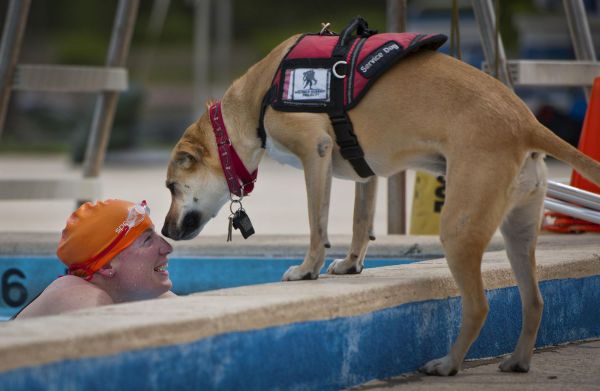
A Call With an ADA Specialist Allowed a Volunteer to Attend an Annual Dinner
Terry is a volunteer for a childcare center. He was looking forward to attending a year-end dinner, but was surprised to learn the organizers planned the dinner in an inaccessible second floor dinner hall. The childcare center told him that they would accommodate him and his wheelchair by carrying him up the stairs. Terry insisted this was not a reasonable modification and suggested that the organizers choose a different location. The organizers ignored his request.
Feeling frustrated, Terry called his local ADA specialist and learned about his rights to a reasonable modification. The next day, he shared the information he learned with the childcare center staff. The staff realized their organization had an obligation to provide a reasonable modification and made a change in venue for the celebration. Later, Terry said he felt "empowered" and "grateful".
Thanks to the ADA, Terry was able to attend a dinner given to celebrate the years of service he and his fellow volunteers provided.

A Driving Exam was Given in an Accessible Format
A man needed to take a driver’s license exam but was concerned that his reading disability might pose a problem with the written section. An ADA specialist he contacted discussed how he could request a reasonable accommodation for the exam from the DMV. The ADA specialist advised him about accommodations and effective communication and said the DMV could read the test out loud if the man preferred.
The man conveyed this information to the DMV office, which worked to provide the proper accommodations; they agreed to give the exam in an audio format to comply with the ADA as well as providing other accommodations the man needed.
Thanks to the ADA, the man was able to take the driving exam and have the results reflect his knowledge and skills rather than his reading disability.
A Hotel Manager Learns About Her Rights and Responsibilities Regarding Service Animals Thanks to the ADA
After a man tried to register his “service parrot” at a hotel, the manager called her local ADA specialist to find out what the regulations are for service animals. They discussed how the legal definition of a service animal is a dog and, in some circumstances, a miniature horse. After they reviewed some FAQs on service animals the hotel manager printed out service animal FAQs and factsheets to have at the front desk. Having that information on hand has helped the staff and manager clarify what kinds of animals can be considered legal service animals and what cannot.

A Small Business Owner Was Able to Ensure Access to Her Business During Construction
Lisa is a small business owner who thought she was in for an uphill battle. The city was about to install water lines on the street in front of her business, which would block the accessible pathway that Lisa, a wheelchair user, and her clients rely on. The pathway connects the accessible parking space on one side of the building to the accessible entrance on the other side.
A call to her regional ADA center led Lisa to an ADA Specialist who said she should contact the city’s ADA Coordinator and explain the situation. The ADA Specialist said that because the city is a covered entity under Title II of the ADA it has an obligation to ensure the accessible pathway remain open. Acting on the ADA Specialist’s advice, Lisa provided information to both the ADA Coordinator and the construction company on how critical the accessible pathway was to her business.
At first Lisa thought no one was going to listen but noticed that once construction began, the city left an accessible route for Lisa and her clients to use. The head of the construction company even came out to meet Lisa, apologizing for the inconvenience.
“Things dramatically changed!” Lisa said. “Without the information I received from the ADA Specialist, my clients and I may not have been able to access to my business.”

A Local Wheelchair Sports Team Wins a Policy Change on the Court Thanks to the ADA
A local wheelchair sports team had been using a nearby college’s basketball court for their wheelchair rugby and wheelchair lacrosse activities. After installing a new floor, the college told the group that they could no longer use the gym because it had established a “no wheels on the floor policy,” explaining that the wheelchairs would damage the new floor. The wheelchair sports team contacted their regional ADA center to get help navigating this situation. The ADA center consulted with the Department of Justice (DOJ) who agreed that the policy was problematic under the ADA because it appeared to prohibit anyone with wheels, prosthetic blades, walkers, or strollers from even using the gym for the non-athletic activities often held there. The wheelchair sports team went back to the college with this information to have a conversation. The college agreed to withdraw the policy, allowing the wheelchair sports team to resume their rugby and lacrosse games while at the college!
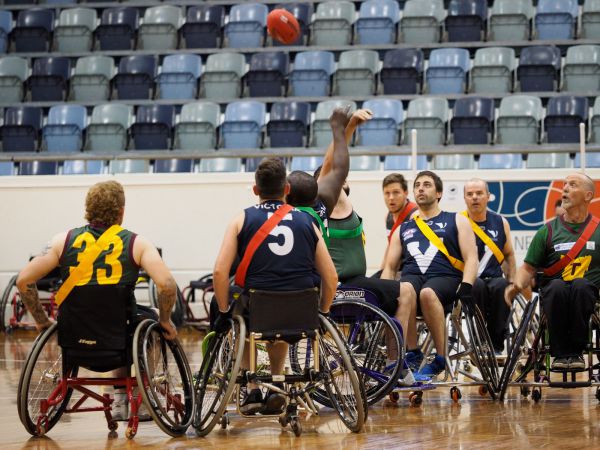
Accessible Lawn Bowling Made Possible Thanks to the ADA
A founding member of a lawn bowling club was denied the opportunity to bowl from a manual wheelchair she uses. The club believed her wheelchair would damage the lawn where bowling happens. At first, she asked the club if they could put down a mat she could bowl from on the lawn. The bowling club said no. The woman called her Regional ADA Center and asked if the ADA could help keep bowling accessible for her in her chair. The ADA specialist told her that because a bowling club falls under Title III of the ADA as a place of public accommodation, she could request a reasonable modification. With this information, the woman informed the club of their responsibilities under the ADA. The bowling club agreed to work with her and the officers of the club obtained an adaptable wheelchair mat that would not damage the lawn, allowing the club’s founding member to bowl from her chair.
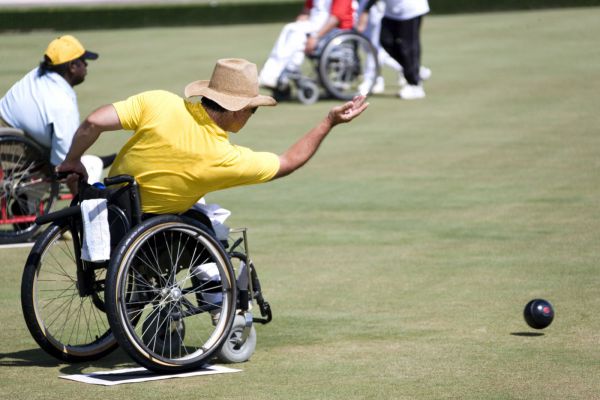
A Call to the ADA Center Helps a Dance Studio Provide an Interpreter for a New Student Who is Deaf
A dance studio owner called her regional ADA Center seeking guidance on accommodating a potential student who is deaf and had requested an interpreter. The ADA Specialist discussed Title III (Public Accommodations and Commercial Facilities) and the studio owner’s responsibilities to ensure effective communication as a public accommodation. After the call, the instructor contacted a local American Sign Language (ASL) organization who was able to provide an interpreter for each class in which the student participated. Personalized assistance from the ADA National Network guided the dance instructor to best accommodate the new student with a disability.

Photograph by Michael Zittel
Portable Healthcare Rooms Allow Everyone to Remotely Access a Doctor
A small business owner who designs portable healthcare rooms or “pods” called their regional ADA center and received valuable guidance on how to improve accessibility. The pods are created for individuals who would like to see a medical provider but doesn’t have easy access to a clinic. They will be placed in grocery stores and pharmacies nationwide.
Each healthcare pod is equipped with a screen through which people can communicate and interact with a doctor. Originally the designer of the pods intended to include healthcare instruments such as a thermometer and blood pressure cuff, as well as a light and camera, allowing the doctor to perform a remote physical exam. After calling the ADA Center, he received crucial feedback regarding accommodations for individuals with differing disability limitations. For example, some individuals may not be able to grasp an instrument with a closed fist, while others may not be able to transfer into a different chair within the room. He also had to take into consideration communication accommodations for individuals with hearing difficulties and/or low vision. Priority was also placed on allowing individuals fully accessible entry to the pods after booking an appointment.
Using the feedback from the ADA center the owner was able to redesign the pods to make them fully accessible. Examples of changes include easy to grasp medical instruments, the ability to request closed captioning or a video interpreter, a foldable built-in chair allowing better access for wheelchairs, and a physically accessible card reader allowing for pod entry. Thanks to the ADA, over the next two years fully accessible pods will be placed in grocery stores and pharmacies nationwide allowing full inclusion for all.
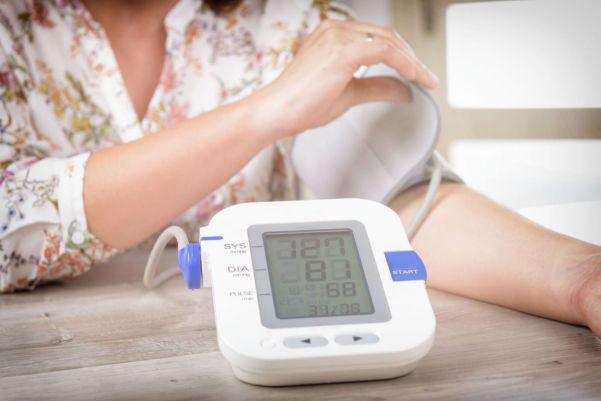
A Young Man with Down Syndrome Attended His Senior Prom Just the Way He Wanted to
Like any other senior in high school, Kevin was excited to go to prom and his father Patrick was going to make sure it would be a memorable night. However, they ran into a roadblock when the school district would not allow Kevin to attend. Kevin has Down syndrome and has an aide that accompanies him, but because the aide was over 21, the school’s policy dictated that he would not be allowed to attend a high school celebration. Patrick called the ADA National Network hoping that they could help him resolve this situation. An ADA Specialist advised him to contact the local school district ADA coordinator and superintendent, and also pointed to information needed to file a complaint. Thanks to Patrick’s efforts guided by the ADA specialist’s advice, the school district gave permission to Kevin and his aide to attend to his high school prom and have a wonderful time!
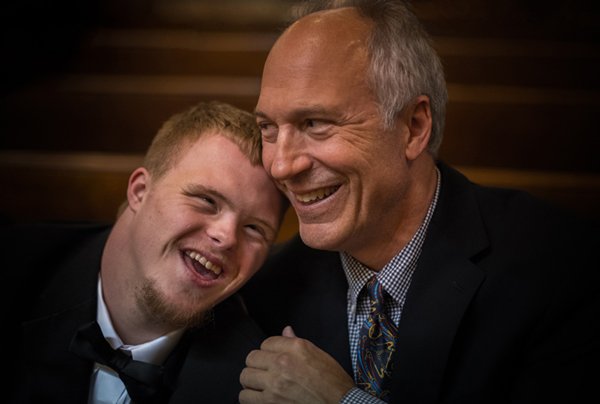
A Pipe Welder Kept His Job with the Assistance of an ADA Center
For the last 10 years a pipe welder who is deaf has successfully worked with his team by communicating with American Sign Language, reading lips, exchanging notes, and using gestures. The company he works for has a contract with a large gas and electricity company, which tests all workers through a certification process. The process recently changed to include an oral portion; gas pipe welders must now respond to verbal questions given by examiners. He failed the test after not responding to the oral questions, even after writing a note asking for a sign language interpreter, which was denied. He called a TA Specialist at one of our ADA centers who advised him to get in touch with his organization’s ADA coordinator in order to ensure that it provides effective communication. The organization’s ADA coordinator worked with the examiners to educate them on their responsibilities under the ADA. As a result, the pipe welder was able to retake the oral portion with a sign language interpreter and passed, keeping his job as a highly skilled and experienced employee.
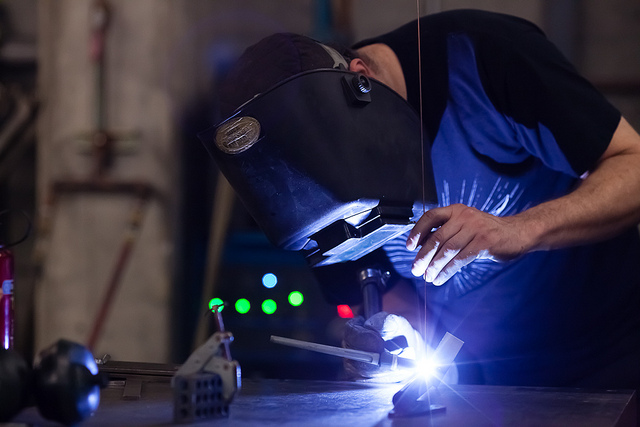
Health Club Chain Becomes More Accessible for Everyone
Abdi, coordinator of a local branch of a health club chain, emailed the ADA National Network with questions about a week-long camp program designed for children with disabilities it runs. The ADA Specialist who reviewed Abdi’s camp brochure caught something that would be problematic: an additional $100 fee for trained counselors that would be available upon request to accommodate children with disabilities. The specialist told Abdi that while they were on the right track to try to accommodate children with disabilities, the camp was obligated to pay the cost of any of those reasonable modifications needed for children with disabilities to participate in camping activities. The ADA specialist also stated that parents should not be charged any additional costs beyond the basic camp fee. The advice prompted the camp to no longer charge additional fees for one-on-one counselors, making the health club chain more accessible for everyone.

A Small-Business Owner Learned That She Did Not Have to Make a Costly Modification to Her Older Building
Andrea called the ADA national hotline with a question facing many businesses: do they need to modify their bathrooms to meet ADA standards? A knowledgeable ADA Specialist informed her that because the ADA went into effect in 1991, all buildings that were operating before that are required to make accessibility improvements that are “readily achievable,” which means that it can be done with relatively little expense and difficulty.
Although she wanted her business to be as accessible as possible, the Business Guide helped Andrea understand that, although highly preferable, businesses are not always required to make their bathrooms accessible – in her case because of the small size of her business and the cost of modifying an older building. The ADA specialist explained that although the law protects the rights of individuals with disabilities, it also incorporates reasonable considerations by businesses and other entities.

A Construction Worker Secured a Job Accommodation After a Call to His Regional ADA Center
When Jake landed a new construction job, he disclosed being bipolar to his manager and requested a 24-hour notice if he was needed at a site earlier than usual. This would allow him to adjust his medication beforehand in order to drive safely.
Although the company agreed to this accommodation, he was cited for being late more than once. Jake called his regional ADA center and was advised that a good first step would be to contact human resources to see if they could work things out.
In the end the company not only reaffirmed his accommodation but made sure to provide a hotel when sites were more than two hours from his home, which has helped him to show up on time as well as has required less driving. The advice left Jake empowered with the knowledge he needed to tackle the barriers he was facing thanks to the ADA.
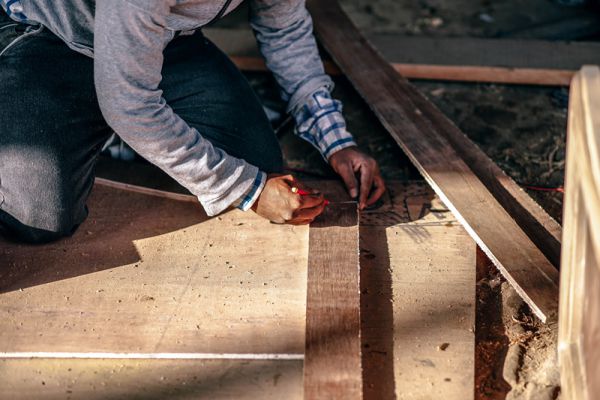
A Business Owner Learns About Her Rights and Responsibilities in Making Her Office Space Accessible Thanks to the ADA
Sarah works for a business that is comprised of basement warehouse and upper-floor office space. Her business is leasing the spaces from a building owner who is responsible for most of the accessibility issues and being up to building code. But as Sarah understands it, her business needs to make sure the space is physically accessible. Consequently, she was wondering what they need to do in order to do so. To get answers, she called one of our regional ADA centers.
Our ADA specialist and Sarah discussed how she might make structural changes for an employee as a reasonable accommodation. The ADA specialist also emphasized that while the building owner may be responsible for making the building accessible as a whole, Sarah’s business has an obligation to be located in an accessible space. Thus, if an employee or client with a disability comes into her shop and cannot access it, it may become her problem, because she made the choice to set up in an inaccessible location. Sarah understood and set up a call with the building owner to make accessibility improvements to the space.


.png)








